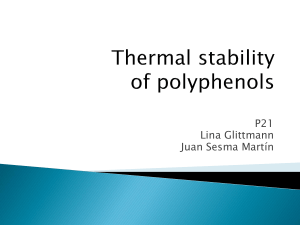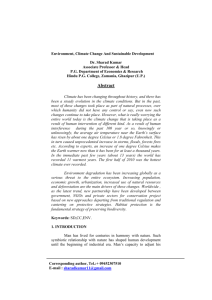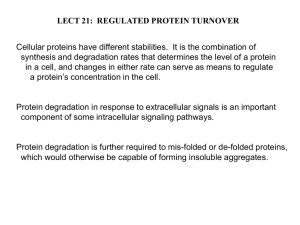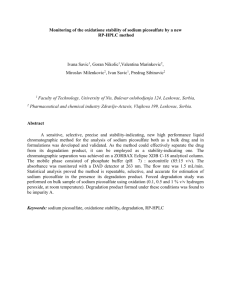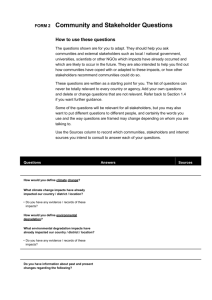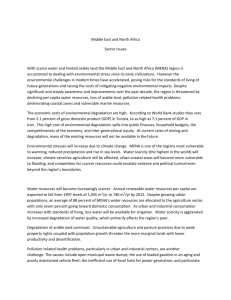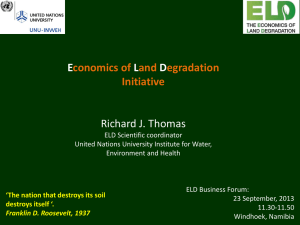degradation of human dominated ecosystems
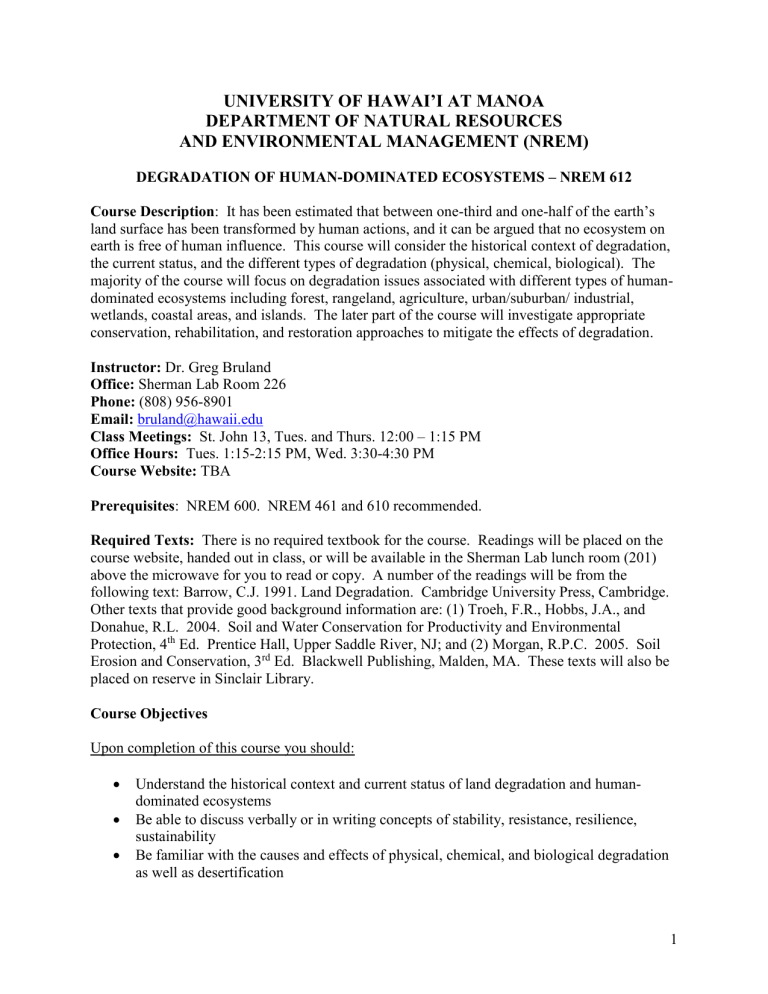
UNIVERSITY OF HAWAI’I AT MANOA
DEPARTMENT OF NATURAL RESOURCES
AND ENVIRONMENTAL MANAGEMENT (NREM)
DEGRADATION OF HUMAN-DOMINATED ECOSYSTEMS – NREM 612
Course Description : It has been estimated that between one-third and one-half of the earth’s land surface has been transformed by human actions, and it can be argued that no ecosystem on earth is free of human influence. This course will consider the historical context of degradation, the current status, and the different types of degradation (physical, chemical, biological). The majority of the course will focus on degradation issues associated with different types of humandominated ecosystems including forest, rangeland, agriculture, urban/suburban/ industrial, wetlands, coastal areas, and islands. The later part of the course will investigate appropriate conservation, rehabilitation, and restoration approaches to mitigate the effects of degradation.
Instructor: Dr. Greg Bruland
Office: Sherman Lab Room 226
Phone: (808) 956-8901
Email: bruland@hawaii.edu
Class Meetings: St. John 13, Tues. and Thurs. 12:00 – 1:15 PM
Office Hours: Tues. 1:15-2:15 PM, Wed. 3:30-4:30 PM
Course Website: TBA
Prerequisites : NREM 600. NREM 461 and 610 recommended.
Required Texts: There is no required textbook for the course. Readings will be placed on the course website, handed out in class, or will be available in the Sherman Lab lunch room (201) above the microwave for you to read or copy. A number of the readings will be from the following text: Barrow, C.J. 1991. Land Degradation. Cambridge University Press, Cambridge.
Other texts that provide good background information are: (1) Troeh, F.R., Hobbs, J.A., and
Donahue, R.L. 2004. Soil and Water Conservation for Productivity and Environmental
Protection, 4 th
Ed. Prentice Hall, Upper Saddle River, NJ; and (2) Morgan, R.P.C. 2005. Soil
Erosion and Conservation, 3 rd
Ed. Blackwell Publishing, Malden, MA. These texts will also be placed on reserve in Sinclair Library.
Course Objectives
Upon completion of this course you should:
Understand the historical context and current status of land degradation and humandominated ecosystems
Be able to discuss verbally or in writing concepts of stability, resistance, resilience, sustainability
Be familiar with the causes and effects of physical, chemical, and biological degradation as well as desertification
1
Have a better understanding the of the complex relationship between land-use and land degradation
Gain an appreciation for the land degradation issues that are unique to tropical islands
Be capable of suggesting appropriate conservation, rehabilitation, or restoration measures to mitigate land degradation in various types of human-dominated ecosystems
Be able to evaluate the scientific merit and contribution of papers in the field of land degradation
Demonstrate more effective participation and facilitation of group discussions
Expectations of Students: I expect that you will do the assigned readings prior to lectures. I expect that you will arrive to class activities on time, with the proper equipment, and that you will be respectful of your fellow students and me during all class activities. I expect you to be an active participant in class activities by taking notes, asking questions, and working with the other students in the course.
Expectations of the Instructor: My goal as an instructor is to make this course as enjoyable and useful to you as possible through a variety of methods such as lectures, readings, written assignments, discussions, exams, field trips, and projects. I will accomplish this by being punctual and prepared for course activities and enthusiastic about my duties as an instructor. I will communicate clearly about course objectives, policies, and assignments and listen carefully to your questions and concerns. I will grade assignments and exams fairly and return them in a timely manner. Finally I will be available during my office hours to provide additional assistance.
Course Activities: Include lectures by the instructor, guest lectures, readings from book chapters and scientific papers, group discussions of the readings, best paper contest, midterm, field trip, and a final project that will include an oral presentation and a final paper.
Paper Critiques: During the last hour of class on Thursdays (usually), starting in the third week of the course, we will discuss designated book chapters, reports, or papers as a class. A one page written critique will be due for each reading. The critique will include a brief summary, followed by your assessment of the strengths and weaknesses of the paper and of the impact it has had or will have on the field of land degradation. During class the article will be discussed with pre-assigned roles determined by the students and instructor.
Best Degradation Paper Contest : An on-going project during the course will be the best paper contest. Students will evaluate peer-reviewed scientific journals to select what they believe is the best degradation paper ever published based on criteria discussed in class (breakthrough discovery, number of times cited, journal impact factor, etc.). This paper may or may not be on the reading list for the course. Each student will be required to nominate a paper and present their justification to the class orally. The winner will be determined by student voting with the instructor acting as a tie-breaker or making the final decision. A prize will be awarded to the winner(s) in addition to bonus points towards the final grade.
2
Midterm Exam: There will be an in-class midterm examination that will be given before spring break. It will consist of multiple choice, fill-in-the-blank, matching, short answer, and essay questions. See Course Schedule for date.
Final Project: Students will work individually on a final project. The project will consist of researching a current land degradation issue of the students’ choice. You will present your findings to the class in an oral presentation at the end of the semester as well as write up a < 20 page final report in scientific journal or M.S./Ph.D. thesis type style; see graduate division website.
Grading:
Activity Quantity
Individual
Points
Total
Points
% of
Grade
Participation
Critiques/Best
Paper Contest
Leading Class
Discussions
Midterm
Final Project
10
1-3
1
1
10
10-30
100
200
70
100
30
100
200
500
15
20
5
20
40
100
Grading Scale: Letter grades will be assigned on the plus/minus system with grades assigned approximately as follows: > 90 % = A, 80-89 % = B, 70-79 % = C, etc.
Other Course Policies
Participation: The 70 participation points will be determined throughout the semester based on attendance, punctuality, attitude, enthusiasm, and participation in course activities.
Late Assignments: Critiques and final project grades will decrease by one level (A to A- or C- to D+) each day following the due date. Assignments will not be accepted more than 5 days after the due date. In case of emergency extensions or absences, the instructor will need to be contacted prior to the due date of the assignment or exam. In such cases, extensions may be granted on an individual basis.
Final Caveat: All material on this syllabus is subject to change at the discretion of the instructor to suite the needs of the course.
3
TENTATIVE COURSE SCHEDULE NREM 612 Spring 2006
Week Lecture/Discussion Topic
1 (1-10) Introductions, Syllabus, Importance
Reading Assignment Other
Vitousek et al. 1997, Read
Western 2001
Barrow 1991 (1-20) Read 1 (1-12)
Concept of “Human-Dominated
Ecosystems,” Historical Context of
Degradation
2 (1-17) Explanatory Theories, Natural versus
Human-Induced
2 (1-19) Degradation Fundamentals: Stability,
Resistance, Resilience, Sustainability
3 (1-24) Physical, Chemical, Biological
Degradation
3 (1-26) Discussion 1
4 (1-31) Human-Dominated Ecosystem (HDE) 1,
Forest
4 (2-2) Discussion 2
5 (2-7) HDE 2, Rangelands & Desertification
Barrow 1991 (21-30) Read
Pimm 1994
Phys-Pimentel et al. 95,
Bio-Stone, Loope 87,
Chem-Barrow (53-67)
Pimentel et al. 1995
Read
1 pg critique
Noble and Dirzo 1997 Read
Nepstad et al. 1997
Milton et al. 1994
Read
1 page critique
Read
5 (2-9)
6 (2-14)
Discussion 3
HDE 3, Agriculture
6 (2-16) Discussion 4
7 (2-21) HDE 4, Urban/Suburban
7 (2-23) Discussion 5
8 (2-28) HDE 5, Wetlands
8 (3-2) Discussion 6
9 (3-7) HDE 6, Coastal Zones
Squires and Bennett
2004
Matson et al. 1997
Green et al. 2005
Barrow 1991 (223-238)
Groffman et al. 2004
Barrow 1991 (117-129)
Richardson et al. 2005
ISRS 2004
9 (3-9) Discussion 7 Roberts et al. 2002
10 (3-14) HDE 7, Islands Barrow 1991 (136-139),
El-Swaify 2000
10 (3-16) Discussion 8 (Possible Field Trip Date
2
) Rolett & Diamond
1 page critique
1 page Final
Project
Proposal
1 page critique
Read
1 page critique
Read
1 page critique
Read
1 page critique
Read
1 page
4
11 (3-21) Catch Up Day & Review
11 (3-23) Mid-Term Examination
12 (3-28) Spring Break
12 (3-30) Spring Break
13 (4-4) Degradation Hotspots (Possible Field Trip
Date
2
)
13 (4-6) Planning, Conservation, Rehabilitation,
Restoration, (Possible Field Trip Date
2
)
14 (4-11) Discussion 9
2004
Barrow critique e
Dobson et al. 1997
< 1 page justifications for the paper,
+ oral presentation to class
1 page critique
14 (4-13) Best Degradation Paper Contest
Presentations
15 (4-18) Individual Project Meetings (Possible
Field Trip Date
2
)
15 (4-20) Catch-Up Day (Possible Field Trip Date
2
)
16 (4-25) Catch-Up Day (Possible Final Project
Presentations)
16 (4-27) Final Project Presentations 3
17 (5-2) Final Project Presentations
1
We will discuss and develop student roles for discussion in class
2
Field Trip may also occur on a Saturday in Mar. or April depending on site availability and student schedules
3 Hard copy (not email) of Final Paper due during scheduled examination period (Thurs. 5/11 at
12:00 PM).
5
